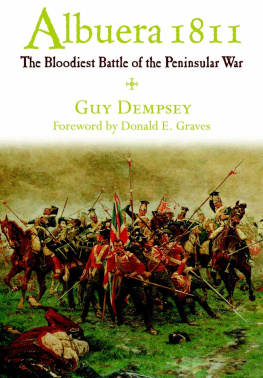Sir Charles William Chadwick Oman KBE - A History of the Peninsular War Volume I 1807-1809
Here you can read online Sir Charles William Chadwick Oman KBE - A History of the Peninsular War Volume I 1807-1809 full text of the book (entire story) in english for free. Download pdf and epub, get meaning, cover and reviews about this ebook. genre: Detective and thriller. Description of the work, (preface) as well as reviews are available. Best literature library LitArk.com created for fans of good reading and offers a wide selection of genres:
Romance novel
Science fiction
Adventure
Detective
Science
History
Home and family
Prose
Art
Politics
Computer
Non-fiction
Religion
Business
Children
Humor
Choose a favorite category and find really read worthwhile books. Enjoy immersion in the world of imagination, feel the emotions of the characters or learn something new for yourself, make an fascinating discovery.

- Book:A History of the Peninsular War Volume I 1807-1809
- Author:
- Genre:
- Rating:4 / 5
- Favourites:Add to favourites
- Your mark:
- 80
- 1
- 2
- 3
- 4
- 5
A History of the Peninsular War Volume I 1807-1809: summary, description and annotation
We offer to read an annotation, description, summary or preface (depends on what the author of the book "A History of the Peninsular War Volume I 1807-1809" wrote himself). If you haven't found the necessary information about the book — write in the comments, we will try to find it.
A History of the Peninsular War Volume I 1807-1809 — read online for free the complete book (whole text) full work
Below is the text of the book, divided by pages. System saving the place of the last page read, allows you to conveniently read the book "A History of the Peninsular War Volume I 1807-1809" online for free, without having to search again every time where you left off. Put a bookmark, and you can go to the page where you finished reading at any time.
Font size:
Interval:
Bookmark:

BY
CHARLES OMAN, M.A.
FELLOW OF ALL SOULS COLLEGE AND DEPUTY-PROFESSOR OF MODERN HISTORY (CHICHELE) IN THE UNIVERSITY OF OXFORD
WITH MAPS, PLANS AND PORTRAITS

This edition is published by PICKLE PARTNERS PUBLISHINGwww.picklepartnerspublishing.com
To join our mailing list for new titles or for issues with our books picklepublishing@gmail.com
Or on Facebook
Text originally published in 1902 under the same title.
Pickle Partners Publishing 2014, all rights reserved. No part of this publication may be reproduced, stored in a retrieval system or transmitted by any means, electrical, mechanical or otherwise without the written permission of the copyright holder.
Publishers Note
Although in most cases we have retained the Authors original spelling and grammar to authentically reproduce the work of the Author and the original intent of such material, some additional notes and clarifications have been added for the modern readers benefit.
We have also made every effort to include all maps and illustrations of the original edition the limitations of formatting do not allow of including larger maps, we will upload as many of these maps as possible.
PREFACE
IT is many years since an attempt has been made in England to deal with the general history of the Peninsular War. Several interesting and valuable diaries or memoirs of officers who took part in the great struggle have been published of late , but no writer of the present generation has dared to grapple with the details of the whole of the seven years of campaigning that lie between the Dos Mayo and Toulouse. Napiers splendid work has held the field for sixty years. Meanwhile an enormous bulk of valuable material has been accumulating in English, French, and Spanish, which has practically remained unutilized. Papers, public and private, are accessible whose existence was not suspected in the thirties; an infinite number of autobiographies and reminiscences which have seen the light after fifty or sixty years of repose in some forgotten drawer, have served to fill up many gaps in our knowledge. At least one formal history of the first importance, that of General Arteche y Moro, has been published. I fancy that its eleven volumes are practically unknown in England, yet it is almost as valuable as Toreos Guerra de la Independencia in enabling us to understand the purely Spanish side of the war.
I trust therefore that it will not be considered presumptuous for one who has been working for some ten or fifteen years at the original sources to endeavour to summarize in print the results of his investigations; for I believe that even the reader who has already devoted a good deal of attention to the Peninsular War will find a considerable amount of new matter in these pages.
My resolve to take in hand a general history of the struggle was largely influenced by the passing into the hands of All Souls College of the papers of one of its most distinguished fellows, the diplomatist Sir Charles Vaughan. Not only had Vaughan unique opportunities for observing the early years of the Peninsular War, but he turned them to the best account, and placed all his observations on record. I suppose that there was seldom a man who had a greater love for collecting and filing information. His papers contain not only his own diaries and correspondence, but an infinite number of notes made for him by Spanish friends on points which he desired to master, and a vast bulk of pamphlets, proclamations, newspapers, and tables of statistics, carefully bound together in bundles, which (as far as I can see) have not been opened between the day of his death and that on which they passed, by a legacy from his last surviving relative, into the possession of his old college. Vaughan landed at Corunna in September, 1808, in company with Charles Stuart, the first English emissary to the Central Junta. He rode with Stuart to Madrid and Aranjuez, noting everything that he saw, from Roman inscriptions to the views of local Alcaldes and priests on the politics of the day. He contrived to interview many persons of importancefor example, he heard from Cuestas own lips of his treasonable plot to overthrow the Junta, and he secured a long conversation with Castaos as to the Capitulation of Baylen, from which I have extracted some wholly new facts as to that event. He then went to Aragon, where he stayed three weeks in the company of the Captain-General Joseph Palafox. Not only did he cross-question Palafox as to all the details of his famous defence of Saragossa, but he induced San Genis (the colonel who conducted the engineering side of the operations) to write him a memorandum, twelve pages long, as to the character and system of his work. Vaughan accompanied Palafox to the front in November, but left the Army of Aragon a day before the battle of Tudela. Hearing of the disaster from the fugitives of Castaoss army, he resolved to take the news to Madrid. Riding hard for the capital, he crossed the front of Neys cavalry at Agreda, but escaped them and came safely through. On arriving at Madrid he was given dispatches for Sir John Moore, and carried them to Salamanca. It was the news which he brought that induced the British general to order his abortive retreat on Portugal. Moore entrusted to him not only his dispatch to Sir David Baird, bidding him retire into Galicia, but letters for Lord Castlereagh, which needed instant conveyance to London. Accordingly Vaughan rode with headlong speed to Baird at Astorga, and from Astorga to Corunna, which he reached eleven days after his start from Tudela. From thence he took ship to England and brought the news of the Spanish disasters to the British Ministry.
Vaughan remained some time in England before returning to Spain, but he did not waste his time. Not only did he write a short account of the siege of Saragossa, which had a great vogue at the moment, but he collected new information from an unexpected source. General Lefebvre-Desnouettes, the besieger of Saragossa, arrived as a prisoner in England. Vaughan promptly went to Cheltenham, where the Frenchman was living on parole, and had a long conversation with him as to the details of the siege, which he carefully compared with the narrative of Palafox. Probably no other person ever had such opportunities for collecting first-hand information as to that famous leaguer. It will please those who love the romantic side of history, to know that Vaughan was introduced by Palafox to Agostina, the famous Maid of Saragossa, and heard the tale of her exploit from the Captain-General less than three months after it had occurred. The doubts of Napier and others as to her existence are completely dissipated by the diary of this much-travelled Fellow of All Souls College.
Vaughan returned to Spain ere 1809 was out, and served under various English ambassadors at Seville and Cadiz for the greater part of the war. His papers and collections for the later years of the struggle are almost as full and interesting as those for 1808 which I have utilized in this volume.
I have worked at the Record Office on the British official papers of the first years of the war, especially noting all the passages which are omitted in the printed dispatches of Moore and other British generals. The suppressed paragraphs (always placed within brackets marked with a pencil) contain a good deal of useful matter, mainly criticisms on individuals which it would not have been wise to publish at the time. There are a considerable number of intercepted French dispatches in the collection, and a certain amount of correspondence with the Spaniards which contains facts and figures generally unknown. Among the most interesting are the letters of General Leith, who was attached to the headquarters of Blake; in them I found by far the best account of the operations of the Army of Galicia in Oct.-Nov., 1808, which I have come upon.
Font size:
Interval:
Bookmark:
Similar books «A History of the Peninsular War Volume I 1807-1809»
Look at similar books to A History of the Peninsular War Volume I 1807-1809. We have selected literature similar in name and meaning in the hope of providing readers with more options to find new, interesting, not yet read works.
Discussion, reviews of the book A History of the Peninsular War Volume I 1807-1809 and just readers' own opinions. Leave your comments, write what you think about the work, its meaning or the main characters. Specify what exactly you liked and what you didn't like, and why you think so.




![Charles William Chadwick Oman - Wellingtons Army 1809-1814 [Illustrated Edition]](/uploads/posts/book/291191/thumbs/charles-william-chadwick-oman-wellington-s-army.jpg)
